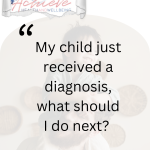Working Through The Grieving Process After a Child’s Diagnosis: A Guide for Parents
Receiving a diagnosis for your child, especially one that indicates a specialized need or condition, can be one of the most challenging experiences a parent can face. It can trigger a profound sense of loss, even amidst the hope for the future and the acknowledgment of your child’s unique strengths. Understanding the grieving process—both as a partnership and as individuals—can help parents navigate this emotional journey in a healthier way.
The Emotional Impact of Diagnosis
When parents first receive a diagnosis, they may experience an overwhelming wave of emotions. According to the National Alliance on Mental Illness (NAMI), parents often cycle through various stages of grief, including shock, denial, anger, bargaining, depression, and acceptance—similar to the traditional Kübler-Ross model of grief (NAMI, 2022). This grieving period can encompass feelings of sadness over the life you imagined for your child, worry about future challenges, and anxiety about the unknown.

Grieving as a Partnership
The journey of grieving can affect parental relationships deeply. Partners may find themselves on different timelines or have contrasting coping mechanisms, which can lead to misunderstanding and strain. Here’s how to nurture the partnership during this challenging time:
- Open Communication: Have honest conversations about your feelings, fears, and coping strategies. Sharing your individual experiences can foster a deeper understanding of each other’s emotional states.
- Empathy: Recognize that your partner may experience grief differently. Offer sincere support and patience as you both navigate this journey together.
- Set Aside Time for Each Other: Amidst the chaos of appointments and caregiving, prioritize time alone together. Date nights or even quiet moments spent together can help rekindle your connection.
- Seek Couple’s Therapy: Professional guidance can be helpful. A therapist who specializes in grief or parenting can facilitate productive discussions and strengthen your relationship during this tumultuous time.
The Individual Grieving Process
Each parent may process the diagnosis differently. Here are some common emotions and strategies for managing individual grief:
-
- Acknowledging Emotions: Allow yourself to feel and express your feelings, whether it’s sadness, frustration, or confusion. Journaling or speaking with a trusted friend can provide an emotional outlet.
- Educating Yourself: Gaining knowledge about your child’s diagnosis can be empowering. Learning about their condition—expected challenges, interventions, and support systems—can help alleviate feelings of helplessness.
- Seeking Support: Connecting with mental health professionals or support groups specifically tailored for parents of children with special needs can provide invaluable emotional assistance. Organizations like the Parent Support Network offer resources and community support.
- Practicing Self-Care: It’s imperative to prioritize your physical and emotional health. Simple acts of self-care—like regular exercise, hobbies, and time away from caregiving responsibilities—can help restore balance.
Moving Forward Together
While the grieving process can be daunting, it can also lead to personal growth and a renewed appreciation for life’s moments. Finding a new normal involves recognizing that your family’s journey will come with both challenges and joys.
- Celebrate Small Victories: Acknowledge and celebrate the achievements—big and small—that your child makes. Focus on goals tailored to their unique capabilities.
- Create a Supportive Environment: Surround yourselves with supportive family and friends, and consider joining community networks. Connecting with others who understand the journey can provide comfort and shared experiences.
- Practice Mindfulness: Mindfulness and gratitude practices can shift your perspective toward more positive aspects of your situation. Regular moments of reflection and gratitude can foster resilience.
- Stay Informed: As your child grows and their needs evolve, stay informed about resources, therapies, and educational opportunities. This proactive approach can reduce anxiety about the future.
Conclusion
Receiving a diagnosis for your child is undoubtedly a challenging experience that can evoke a range of emotions. Understanding and acknowledging the grieving process, individually and as a partnership, can be pivotal in navigating this new chapter of life.
As you face the path ahead, remember that grief is not linear, and it’s okay to seek help along the way. Embrace the journey with love, and know that both you and your child can emerge from this experience stronger and more connected than ever.
References:
- National Alliance on Mental Illness (NAMI). (2022). Grief and Loss. Retrieved from NAMI Website
Navigating this complex emotional landscape is a testament to your love and commitment as a parent. In recognizing your struggles and seeking support, you not only enhance your resilience but also create a nurturing environment that benefits your entire family.








